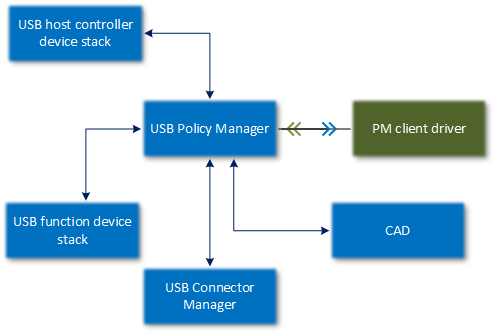Write a USB Type-C Policy Manager client driver
The Microsoft-provided USB Type-C Policy Manager monitors the activities of USB Type-C connectors. Windows, version 1809, introduces a set of programming interfaces that you can use to write a client driver to Policy Manager (called a PM client driver in this topic). The client driver can participate in the policy decisions for USB Type-C connectors. With this set, you can choose to write a kernel-mode export driver or a user-mode driver.
The Policy Manager gets and coordinates the information from the USB Connector Manager (UCM), USB host controller, and USB function, and your PM client driver. When UI notification is required, the Policy Manager sends the request to system Shell.

For a full view of the drivers, see Architecture: USB Type-C design for a Windows system.
Important APIs
The PM APIs are declared in the Usbpmapi.h header.
1: Client Registration
- The client driver calls UsbPm_Register to register the driver's callback functions.
- The client driver waits for an event from the Policy Manager.
A successful UsbPm_Register call doesn't guarantee that the client driver has requested access. When the Policy Manager is ready, the driver's EVT_USBPM_EVENT_CALLBACK gets invoked with PolicyManagerArrival as the event data that indicates the actual access granted.
- The UsbPm_Register call returns the registration handle.
The client driver may receive EVT_USBPM_EVENT_CALLBACK even before UsbPm_Register returns.
2: Hub Arrival
- When a UCMCX device arrives, the POlicy Manager is notified and keeps track of all the hub handles along with properties and states of all the connectors on each hub.
- The client driver's EVT_USBPM_EVENT_CALLBACK gets invoked with HubArrivalRemoval as the event data. The call also contains the hub handles.
- In the client driver's implementation of EVT_USBPM_EVENT_CALLBACK, the driver calls UsbPm_RetrieveHubProperties to get the number of connectors on the hub, and then calls UsbPm_RetrieveConnectorProperties and UsbPm_RetrieveConnectorState to get more information about each connector.
3: Connector State Change
- Due to a connector state change, for example, Type-C attach/detach, PD contract negotiated, Policy Manager updates the per-connector state information.
- The client driver's EVT_USBPM_EVENT_CALLBACK gets invoked with ConnectorStateChange as the event data. The call also contains the connector handles.
- The client driver's completion routine also gets called, and takes action accordingly.
- In the client driver's implementation of EVT_USBPM_EVENT_CALLBACK, the driver calls UsbPm_RetrieveConnectorProperties. By using the given connector handle, the driver gets the latest connector state, inspects it, and may decide to update its local copy.
4: Change initiated by the client driver
To request a change the client driver calls UsbPm_AssignConnectorPowerLevel.
The client driver may call this function within the EVT_USBPM_EVENT_CALLBACK callback registered using UsbPm_Register.
The Policy Manager forwards the request to USB Connector Manager (UCM). The client driver for UcmCx takes the appropriate action to change the requested state.
The client driver's EVT_USBPM_EVENT_CALLBACK gets invoked with ConnectorStateChange as the event data. The call also contains the connector handle.
The client driver's completion routine also gets called, and takes action accordingly.
Within the callback, client driver calls UsbPm_RetrieveConnectorState with the given connector handle to get the latest connector state, inspects it and may decide to update its local copy.
5: Hub Removal
- UCM notifies the Policy Manager when a UcmCx device (not an individual connector on a UcmCx device) is removed. The Policy Manager removes the hub from its hub collection.
- The client driver's EVT_USBPM_EVENT_CALLBACK implementation gets invoked with HubRemoval as the event data. The call also contains the hub handle.
- In the client driver's implementation of EVT_USBPM_EVENT_CALLBACK, the client driver performs clean-up tasks for the hub and connectors being removed. The driver can call UsbPm_RetrieveHubProperties and UsbPm_RetrieveConnectorProperties to get the properties of hub and connectors.
6: Client Deregistration
- The client driver calls UsbPm_Deregister when the driver no longer needs any notifications.
- The Policy Manager marks the client handle registration as deregistered and does not invoke EVT_USBPM_EVENT_CALLBACK callback.